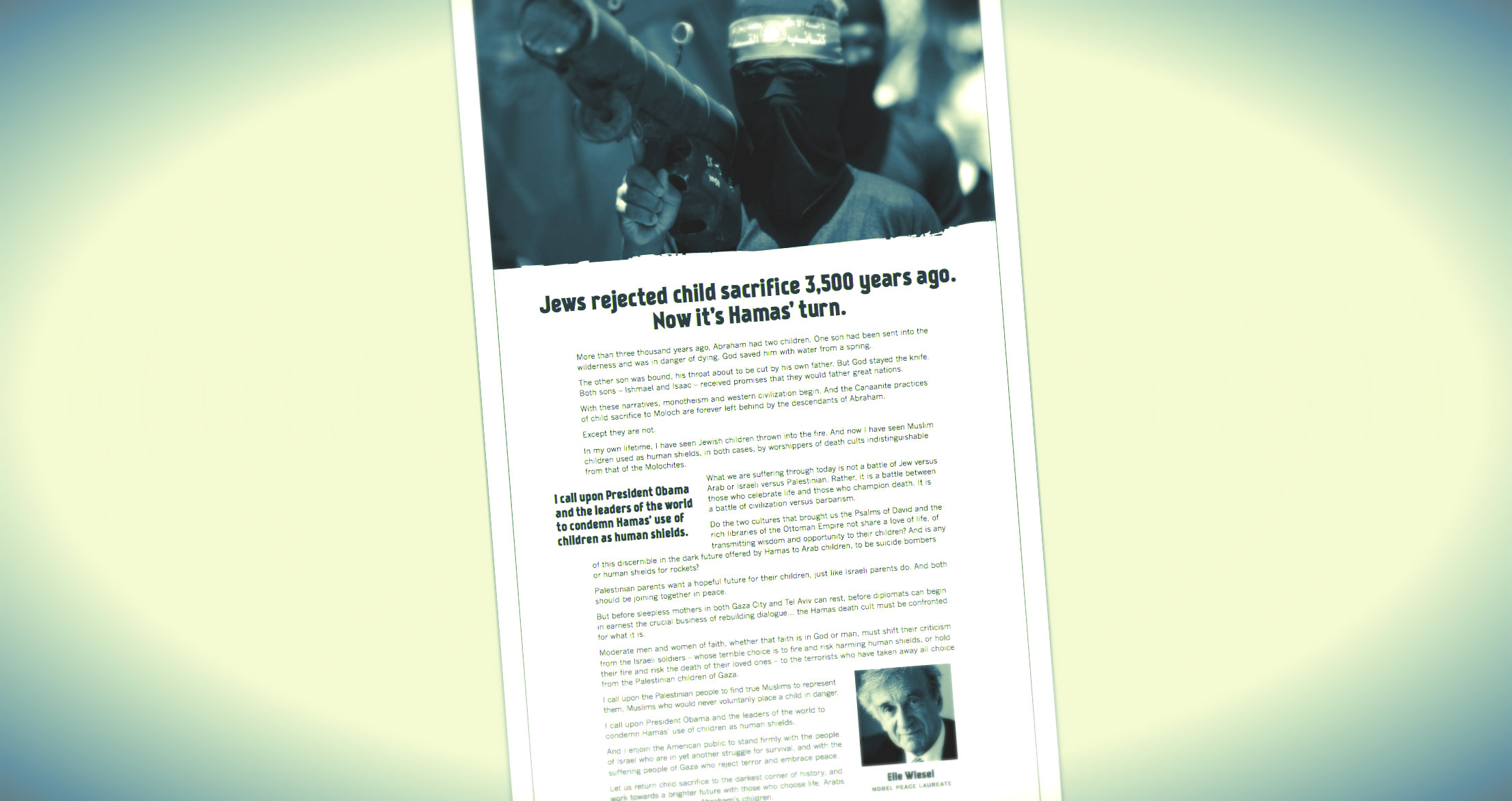
Britain’s ironically named ‘Stop the War’ coalition has effectively come out in defence of Hamas following a newspaper advert which highlighted the terrorist group’s human rights abuses.
The advert by Nobel Laureate Elie Wiesel was scheduled to feature in today’s Guardian newspaper, but was staunchly opposed by the group which recently called for war against Israel, in direct contravention to the organisation’s name and raison-d’etre.
The organisation lashed out against the advert which was titled: “Jews rejected child sacrifice 3,500 years ago. Now it’s Hamas, turn” and went on to explain how Hamas puts Muslim children in the front line against Israel. It read:
“Palestinian parents want a hopeful future for their children, just like Israeli parents do. And both should be joining together in peace.
“But before sleepless mothers in both Gaza City and Tel Aviv can rest, before diplomats can begin in earnest the crucial business of rebuilding dialogue… the Hamas death cult must be confronted for what it is.
“Moderate men and women of faith, whether that faith is in God or man, must shift their criticism from the Israeli soldiers – whose terrible choice is to fire and risk harming human shields, or hold their fire and risk the death of their loved ones – to the terrorists who have taken away all choice from the Palestinian children of Gaza.
“I call upon the Palestinian people to find true Muslims to represent them, Muslims who would never voluntarily place a child in danger”.
But the Stop the War coalition disagreed with the call for peace, and seemingly objected to Wiesel’s contention that children should not be used as a part of Hamas’s war against the Jewish State.
The group’s co-founder John Rees, as well as Lindsey German (Convenor), Sarah Colborne from the Palestine Solidarity Campaign, Member of Parliament Jeremy Corbyn, Kate Hudson, the General Secretary for the Campaign for Nuclear Disarmament, and a number of others, said today:
We write to condemn the Guardian’s decision to print a wildly inaccurate and inflammatory advert from supporters of the state of Israel branding Palestinians opposing Israel in Gaza as ‘child killers’. [The ad specifically blames Hamas and doesn’t use that phrase, but never mind.] This is especially sickening when Israel’s latest bombardment of Gaza has killed close to 400 Palestinian children. Amnesty International has condemned the deliberate targeting of schools and hospitals by Israel as a war crime.
Among the advert’s very many inaccuracies is the claim that those forces opposing Israel do not have the support of Palestinians when the current Israeli offensive is against a united Hamas-Fatah government which commands the support of the majority of Palestinians.
Sadly the decision to print this advert, rejected by The Times newspaper, is another sign of the increasingly pro-Israeli bias of the Guardian’s editorial policy, including the gross underestimate of the size of last Saturday’s Gaza protest demonstration. You are repeatedly running the slur that those who campaign in support of Palestine are anti-Semitic when the very many Jews in the movement and the movement as a whole have repeatedly made it absolutely clear that this is not the case. [Well, as long as they’ve repeatedly made it absolutely clear…]
We call on the editor to redress the balance in future coverage.
It appears the Stop the War coalition is hook, line and sinker falling for, and indeed promoting the Hamas line on the conflict.
The Times of London initially refused to run the advert five days ago, claiming that “the opinion being expressed is too strong and too forcefully made and will cause concern amongst a significant number of Times readers”.
Last year the Times ran a controversial, blood libel cartoon smearing the State of Israel and Israeli Prime Minister Benjamin Netanyahu. Rupert Murdoch later apologised, though no mention was made of the cartoonist’s opinion being “too strong” or his point being “too forcefully made”.
The cartoon caused concern amongst a significant number of Times readers.

COMMENTS
Please let us know if you're having issues with commenting.